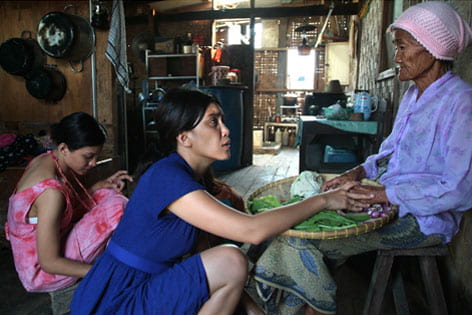From the director's chair: a woman's perspective
UC Irvine’s Film and Video Center showcases the accomplishments of five female filmmakers this month, including movie co-directed by UCI professor Fatimah Tobing Rony.

American film schools are graduating equal numbers of men and women, yet men continue to direct the vast majority of big-budget Hollywood films.
UC Irvine’s Film & Video Center showcases the accomplishments of five female filmmakers this month with a series, “Women Direct Movies.” Screenings include a rare, uncensored showing of a movie co-directed by Fatimah Tobing Rony, UCI professor of film & media studies.
“More female producers and directors exist in other countries, so it can be easier to make a narrative film abroad than in Hollywood,” says Rony, who also is curating the series. “My first directing opportunity was in the Indonesian film industry. In other countries, women directors are not in the minority.”
Rony’s film, “Perempuan Punya Cerita” (“Chants of Lotus”), will show at 7 p.m. Thursday, Feb. 26, in Lucille Kuehn Auditorium (Humanities Instructional Building, Room 100). The movie features four stories – told by four female filmmakers – about marginalized women in Indonesia.
Before its 2008 theatrical release in Indonesia, “Chants of Lotus” was heavily edited by the country’s censorship board because of subject matter including teenage sexuality, child trafficking and AIDS. The result, Rony says, was a disorienting movie in which some of the stories no longer made sense.
The UCI showing will screen the entire 105-minute film.
“This is a film that touches on taboo issues,” Rony says. “There is nothing sweet about it – there are parts that are rough and graphic and at times violent. But it depicts the truth.”
Rony directed “Chant From an Island,” a segment of the film about a midwife on a deserted island who sacrifices her health to rescue a mentally challenged woman. The 83-member cast and crew filmed the story on an isolated Indonesian island about three hours from Jakarta, without easy access to cars, fresh water or daytime electricity.
To achieve realism, Rony and other members of the production team took several research trips around the island of Java to HIV and AIDS centers and support groups, and to hospitals to meet midwifery students.
“There is nothing like it,” Rony says of the filmmaking process. “It is intellectual, creative and physical because you are convincing people to act and thereby creating something that involves all of one’s senses and capacities.
“Making a film is one of the most harrowing and exciting things to do.”